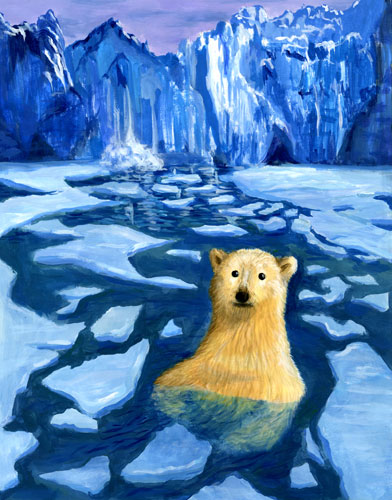 A thick, gloomy marine fog holds gray-hostage our environment this Friday afternoon on California’s north coast — clouds to the east appear heavy with rain, but apparently it just looks that way — just heavy layers of dry.
A thick, gloomy marine fog holds gray-hostage our environment this Friday afternoon on California’s north coast — clouds to the east appear heavy with rain, but apparently it just looks that way — just heavy layers of dry.
Dry is the subject of climate change in California, i.e., a notorious drought and our only habitat is swiftly shifting into a kill zone.
Last week, the US Geological Survey released a study which found a third of Alaska’s polar bears could be gone in a decade.
Meanwhile, this week another such study found bumblebees are also in trouble — “populations are disappearing” in North America and Europe due to climate change.
And yesterday, a new paper revealed that despite everything, the world’s oceans could rise at least 20 feet above current levels due to climate change.
(Illustration found here).
Freak-out time, or fucking what?
In all appearances, and those findings listed above from different sets of brainiacs are just a small sample of research/studies/reports, and so-forth-n-so-on, that appear way-more frequently nowadays, generally covering just about everything, and pointing into the way-immediate future, so yes, it’s time to freak.
However, to anyone who keeps a half-ass eye on the unfolding science, and to that way-miniscule group that read this blog on a semi-daily fashion, you know I pretty-much arrived at the freak-out level years ago. One real-good indicator are the people who study climate and all its side shows — if they’re freaked-out, got mean something, huh?
And such a thing be. A most-depressing read, but one that should be read by everyone, a long-read, detailed piece at Esquire by John H. Richardson, who interviews several well-known scientists about the pessimism of climate change, and the reality of their work. (h/t Lawyers,Guns&Money)
One of those is Glaciologist Jason Box:
As a leading climatologist who spent many years studying the Arctic at the Byrd Polar and Climate Research Center at Ohio State, Box knew that this breezy scientific detachment described one of the nightmare long-shot climate scenarios: a feedback loop where warming seas release methane that causes warming that releases more methane that causes more warming, on and on until the planet is incompatible with human life.
And he knew there were similar methane releases occurring in the area. On impulse, he sent out a tweet.
“If even a small fraction of Arctic sea floor carbon is released to the atmosphere, we’re f’d.”
I remember that, too, from last summer. Way-scary, and Box got in public trouble, like just most climate scientists who run up against asshole climate-change denial, but yet is the reality of life:
Among climate activists, gloom is building.
Jim Driscoll of the National Institute for Peer Support just finished a study of a group of longtime activists whose most frequently reported feeling was sadness, followed by fear and anger.
Dr. Lise Van Susteren, a practicing psychiatrist and graduate of Al Gore’s Inconvenient Truth slide-show training, calls this “pretraumatic” stress.
“So many of us are exhibiting all the signs and symptoms of posttraumatic disorder—the anger, the panic, the obsessive intrusive thoughts.”
Leading activist Gillian Caldwell went public with her “climate trauma,” as she called it, quitting the group she helped build and posting an article called “16 Tips for Avoiding Climate Burnout,” in which she suggests compartmentalization: “Reinforce boundaries between professional work and personal life. It is very hard to switch from the riveting force of apocalyptic predictions at work to home, where the problems are petty by comparison.”
Although dire, the problem is at hand. Although Gavin Schmidt at NASA’s Goddard Institute for Space Studies wants to be optimistic, the voice of reality:
Box’s tweet sets his teeth on edge.
“I don’t agree. I don’t think we’re fucked. There is time to build sustainable solutions to a lot of these things. You don’t have to close down all the coal-powered stations tomorrow. You can transition. It sounds cute to say, ‘Oh, we’re fucked and there’s nothing we can do,’ but it’s a bit of a nihilistic attitude. We always have the choice. We can continue to make worse decisions, or we can try to make ever better decisions. ‘Oh, we’re fucked! Just give up now, just kill me now,’ that’s just stupid.”
…
“The glaciers are going to melt, they’re all going to melt,” he says.
“But my reaction to Jason Box’s comments is — what is the point of saying that? It doesn’t help anybody.”
Hence, the anxiety. As I noted already, a must-read.
Yet what’s the answer, even if indeed, ‘we’re fucked,’ and nowhere to flee forth?
Al Gore, the public face of climate change, said today in an interview:
“I feel certain there will be an agreement in Paris and everyone will be on board.
I say that with a high level of confidence because the architecture of this agreement is different from those in the past.
Each nation will set its own goals and they will become legally binding within their own laws.
The deal between China and the U.S. (last year) has made me optimistic.
Now, will this deal be strong enough to hold temperature increases to below the two degree Celsius threshold? That is not yet clear.”
The last line is reminiscent of the immortal words of lovable, infamous Pinball: ‘“Or as they say in Ebonics, “We be fucked.”‘